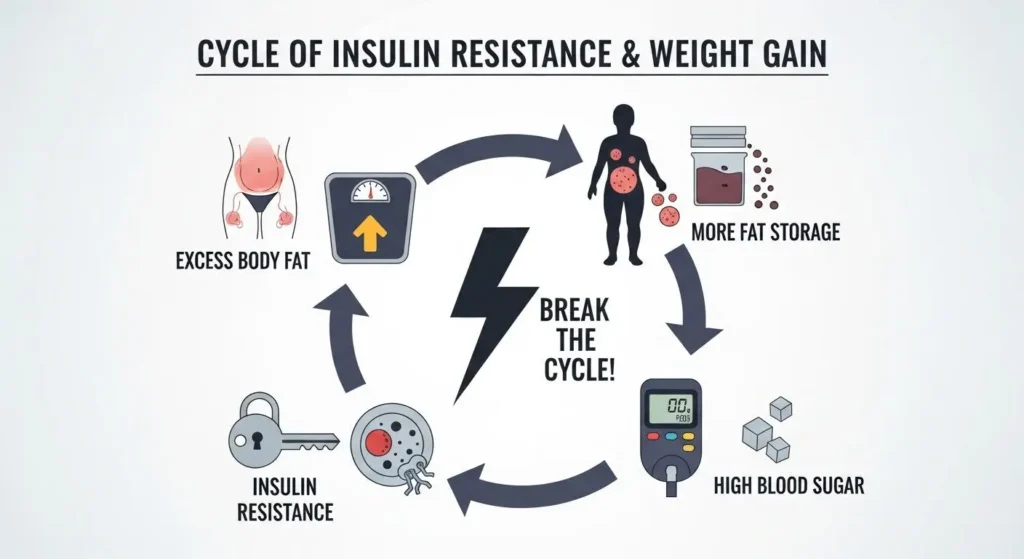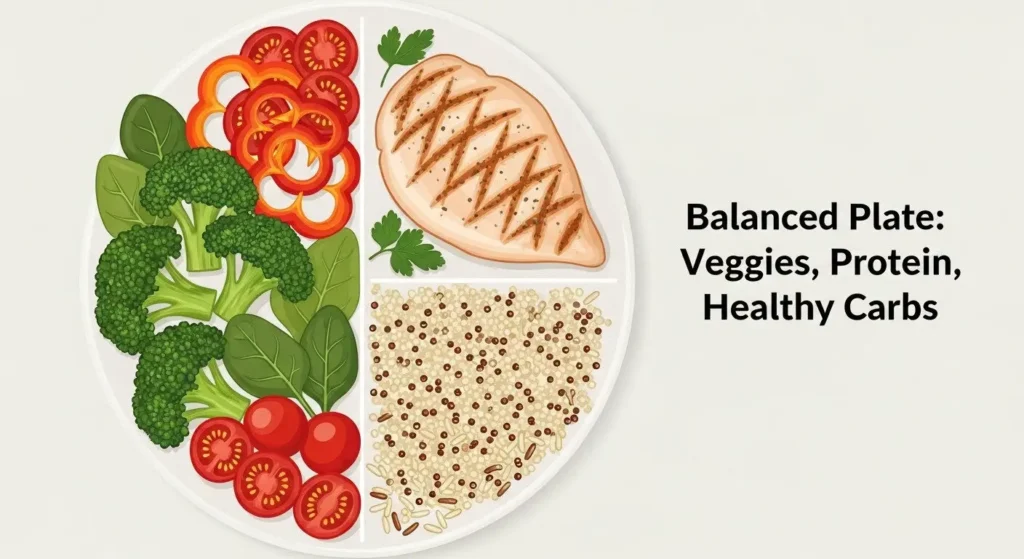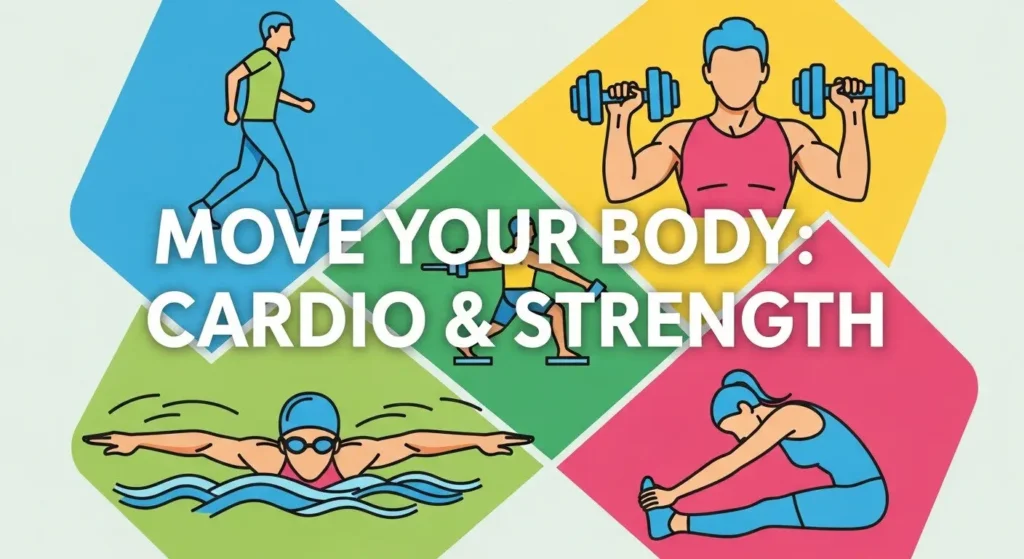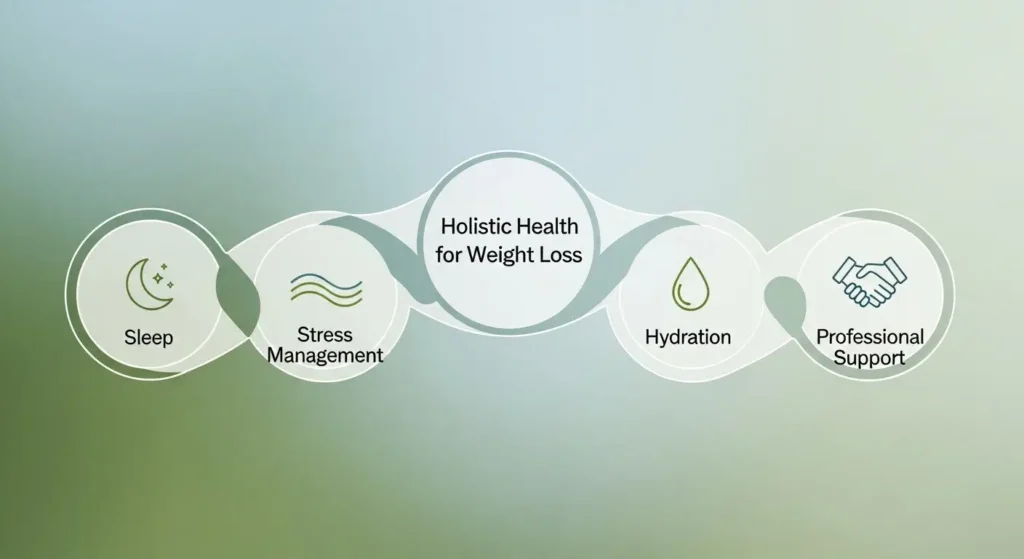Living with type 2 diabetes means paying close attention to your health, and one of the most powerful steps you can take is focusing on type 2 diabetes weight loss. For many, losing even a small amount of weight can make a huge difference in how their body uses insulin, helping to control blood sugar levels and even reduce the need for certain medications.

It's not always easy, but with the right information and a clear plan, you can make real progress. This guide is here to help you understand why type 2 diabetes weight loss is so important and give you practical, easy-to-follow steps to start your journey towards a healthier you. Let's dive in!

Key Takeaways
- Weight Loss is Crucial: Losing even 5-10% of your body weight can significantly improve blood sugar control and reduce diabetes complications.
- Balanced Diet is Key: Focus on whole, unprocessed foods, plenty of vegetables, lean proteins, and healthy fats while limiting sugary drinks and refined carbs.
- Move Your Body Regularly: Combine aerobic exercises (like walking) with strength training to boost metabolism and improve insulin sensitivity.
- Lifestyle Matters: Good sleep, stress management, and staying hydrated are just as important as diet and exercise for successful weight loss.
- Seek Professional Support: Work with your doctor, a dietitian, or a diabetes educator to create a personalized plan and get ongoing guidance.
Understanding Type 2 Diabetes Weight Loss
Imagine your body like a car, and insulin is the key that lets sugar (glucose) from your food get into your cells for energy. In Type 2 Diabetes, your body either doesn't make enough insulin, or the insulin it does make doesn't work as well as it should. This is called insulin resistance.
When you carry extra weight, especially around your belly, it makes insulin resistance worse. Fat cells, particularly those deep inside your abdomen, release chemicals that make your body's cells less sensitive to insulin. Managing type 2 diabetes weight loss is crucial, as excess weight allows more sugar to remain in the bloodstream, driving high blood sugar levels.

Why is Weight Loss So Important?
Think of weight loss as a way to “re-sensitize” your body to insulin. When you lose weight:
- Insulin works better: Your cells become more responsive to insulin, allowing sugar to enter them more easily. This lowers your blood sugar.
- Less medication needed: Many people find that significant type 2 diabetes weight loss can help reduce or even eliminate the need for diabetes medications, always under a doctor's guidance.
- Reduced health risks: Losing weight also reduces the risk of other serious conditions often associated with type 2 diabetes weight loss, including heart disease, stroke, and kidney disease.
- More energy, better mood: You'll likely feel better overall, have more energy, and enjoy a better quality of life.
“Losing even 5-10% of your body weight can have a significant impact on blood sugar control and reduce the risk of diabetes complications.”
The Foundation: Diet and Nutrition
When it comes to type 2 diabetes weight loss, what you eat is incredibly important. It's not about strict dieting forever, but about making smart, sustainable food choices that nourish your body and help manage your blood sugar.
Focus on Whole Foods
Think of foods that come straight from nature, not from a factory.
- Vegetables: Load up your plate with non-starchy vegetables like leafy greens, broccoli, bell peppers, and green beans. They are low in calories and carbs but packed with fiber and nutrients.
- Fruits: Enjoy fruits in moderation, especially berries, apples, and oranges, which have natural sugars but also fiber.
- Lean Proteins: Choose lean meats, poultry without skin, fish (especially fatty fish like salmon for healthy fats), eggs, beans, lentils, and tofu. Protein helps you feel full and supports muscle.
- Healthy Fats: Include avocados, nuts, seeds, and olive oil. These fats are good for your heart and help with satiety.
- Whole Grains: Opt for whole grains like oats, quinoa, brown rice, and whole-wheat bread instead of refined grains (white bread, white rice). They have more fiber, which slows down sugar absorption.
Watch Your Carbohydrates
Carbohydrates have the biggest impact on your blood sugar levels. You don't have to cut them out completely, but being mindful of the type and amount is key.
- Limit Sugary Drinks: Sodas, fruit juices, and sweetened teas are liquid sugar bombs that cause rapid blood sugar spikes. Choose water, unsweetened tea, or coffee instead.
- Say No to Processed Foods: Cookies, cakes, chips, and fast food are often high in unhealthy fats, sugar, and refined carbs. These offer little nutrition and contribute to weight gain.
- Consider Carb Counting: Learning how many carbs are in your food can help you manage your portions and blood sugar. Your doctor or a dietitian can guide you on a carb target that's right for you.
- Meal Timing: Some people find success with specific meal timing strategies, like intermittent fasting. This involves eating during a specific window of hours each day. If you're curious about short-term fasting protocols, you can learn more about how a 3-day fast for weight loss might work, but always discuss such strategies with your healthcare provider first.
Portion Control: The Art of “Just Enough”
Even healthy foods can lead to weight gain if you eat too much.
- Use smaller plates.
- Measure your food, especially in the beginning, to learn what a proper serving size looks like.
- Pay attention to your body's hunger and fullness cues. Eat slowly and stop when you're satisfied, not stuffed.

Moving Your Body: Exercise and Activity
Exercise is a powerful tool for type 2 diabetes weight loss and blood sugar control. It helps your body use insulin more effectively and burns calories. You don't need to become an athlete overnight; small steps add up!
Aerobic Exercise (Cardio)
This type of exercise gets your heart rate up and helps burn calories.
- Aim for at least 150 minutes per week: That's about 30 minutes, five days a week.
- Choose activities you enjoy: Brisk walking, jogging, cycling, swimming, dancing, or even gardening.
- Start slow and build up: If you're new to exercise, begin with 10-15 minutes a few times a week and gradually increase the time and intensity.
- Break it up: You don't have to do all 30 minutes at once. Three 10-minute walks throughout the day are just as effective.
Strength Training
Building muscle is excellent for supporting type 2 diabetes weight loss. Muscles use more glucose for energy, even at rest, which helps improve blood sugar control.
- Aim for 2-3 times a week: Work all major muscle groups.
- No gym needed: You can use your own body weight (push-ups, squats, lunges), resistance bands, or light dumbbells.
- Examples: Lifting weights, doing squats, lunges, push-ups, or using resistance bands.
- Consult a professional: If you're unsure, a certified personal trainer can show you proper form.
Make it a Habit!
- Set realistic goals: Don't aim for perfection, aim for consistency.
- Find an accountability partner: Exercise with a friend or family member.
- Track your progress: Use an app or a simple notebook to log your activity. Seeing your progress can be very motivating!
- Stay safe: Always check with your doctor before starting a new exercise program, especially if you have existing health conditions. Be aware of your blood sugar levels before, during, and after exercise.

Beyond Diet and Exercise: Lifestyle Factors
While diet and exercise are cornerstones, other lifestyle habits play a huge role in your type 2 diabetes weight loss journey.
Get Enough Sleep
Poor sleep can mess with your hormones that control hunger and fullness. When you're tired, your body produces more ghrelin (the hunger hormone) and less leptin (the fullness hormone), making you crave unhealthy foods and store more fat. Aim for 7-9 hours of quality sleep each night.
- Create a consistent sleep schedule: Go to bed and wake up around the same time each day, even on weekends.
- Make your bedroom sleep-friendly: Dark, quiet, and cool.
- Limit screen time before bed: The blue light from phones and tablets can disrupt sleep.
Manage Stress
Stress can affect your blood sugar levels and lead to weight gain. When you're stressed, your body releases hormones like cortisol, which can increase blood sugar and encourage fat storage, especially around your belly.
- Find healthy ways to relax: Try meditation, deep breathing exercises, yoga, spending time in nature, or listening to calming music.
- Don't bottle it up: Talk to a trusted friend, family member, or therapist about your worries.
- Prioritize self-care: Make time for activities that you enjoy and that help you unwind.
Stay Hydrated
Drinking enough water is essential for your overall health and can support weight loss. Sometimes, your body confuses thirst with hunger, leading you to eat when you just need a drink.
- Drink water throughout the day: Keep a water bottle handy.
- Choose water over sugary drinks: This is an easy way to cut down on empty calories.
- Listen to your body: Drink when you're thirsty.
Mindset and Support
Weight loss is a marathon, not a sprint. Your mindset can make all the difference.
- Set Realistic Goals: Don't aim for perfection. Small, consistent changes are more sustainable.
- Track Your Progress: Keep a food diary, track your weight, or monitor your blood sugar. Seeing your efforts pay off can be incredibly motivating.
- Celebrate Small Wins: Acknowledge every positive step you take, no matter how small.
- Seek Support: Join a support group, talk to friends or family who understand, or work with a coach. Having someone to share your journey with can provide encouragement and accountability.

Medical and Professional Guidance
While diet and exercise are powerful, achieving type 2 diabetes weight loss is often a team effort. Working with healthcare professionals provides personalized guidance and support.
Your Healthcare Team
- Doctor: Your primary care doctor or endocrinologist can monitor your blood sugar, adjust medications, and recommend appropriate weight loss strategies. They can also refer you to specialists.
- Registered Dietitian (RD): A dietitian specializes in nutrition and can help you create a personalized meal plan that fits your needs, preferences, and blood sugar goals. They can teach you about carb counting, portion control, and healthy eating habits.
- Certified Diabetes Educator (CDE): CDEs are experts in all aspects of diabetes management, including diet, exercise, medication, and coping strategies. They can provide practical education and support.
Medications for Weight Loss
For some individuals, especially those with significant weight to lose or whose blood sugar is difficult to control, doctors may consider medications that also aid weight loss. These might include:
- GLP-1 receptor agonists: Drugs like Ozempic, Victoza, or Trulicity can help lower blood sugar, slow digestion, and reduce appetite, leading to weight loss.
- SGLT2 inhibitors: Medications like Farxiga or Jardiance help your kidneys remove more sugar from your body through urine, which can also result in some weight loss.
- Other weight loss medications: In certain cases, your doctor might prescribe specific weight loss medications if appropriate for your health profile.
Important: These medications are prescribed by a doctor and are usually part of a broader weight management plan that includes diet and exercise. They are not a magic bullet.
Bariatric Surgery
For individuals with type 2 diabetes weight loss and severe obesity (very high BMI), bariatric surgery might be an option. Procedures like gastric bypass or sleeve gastrectomy can lead to significant and sustained weight loss, often producing dramatic improvements in blood sugar control and even diabetes remission for many. This major decision requires careful consideration and discussion with your healthcare team.
Supplements: A Word of Caution
The market is flooded with weight loss supplements, but it's crucial to be cautious. Many lack scientific evidence, and some can even be harmful, especially for people with diabetes.
- Always talk to your doctor: Before taking any supplement, discuss it with your healthcare provider. They can advise you on potential interactions with your diabetes medications or other health conditions.
- Focus on proven methods: Prioritize diet and exercise, which have strong scientific backing for Type 2 Diabetes management and weight loss.
Some people explore various options to support their weight loss journey, and there are many products out there, such as those reviewed in Liv Pure reviews. However, always remember that supplements should complement, not replace, a healthy lifestyle and medical advice.
Overcoming Challenges and Staying Motivated
The path to type 2 diabetes weight loss isn't always smooth. You'll have good days and challenging days. Here's how to navigate common hurdles:
Dealing with Plateaus
Weight loss often isn't a straight line down. You might hit a plateau where your weight stays the same for a few weeks, even if you're doing everything right.
- Don't get discouraged! Plateaus are normal. Your body is adjusting.
- Re-evaluate: Double-check your food intake (are you accidentally eating more than you think?) and exercise routine (can you increase intensity or duration slightly?).
- Focus on non-scale victories: Are your clothes fitting better? Do you have more energy? Are your blood sugar levels improving? These are equally important signs of progress.
- Stay consistent: Keep doing the healthy habits you've built.
Staying Motivated Long-Term
Motivation can come and go. Here's how to keep it going:
- Remind yourself of your “why”: Why did you start this journey? Is it for more energy, better health, to play with your grandkids, or to reduce medication? Keep your reasons front and center.
- Find joy in the process: Discover healthy foods you love, and find exercises that you actually enjoy doing.
- Build a support system: Surround yourself with people who encourage you.
- Forgive yourself for slip-ups: One unhealthy meal or missed workout doesn't ruin your progress. Just get back on track with your next meal or activity.
- Focus on habits, not just the scale: Celebrate forming new healthy habits, like eating breakfast every day or taking a daily walk. These habits lead to long-term success.
Remember, every step you take towards a healthier lifestyle is a victory. Be patient with yourself, celebrate your efforts, and know that you are building a stronger, healthier future.
Conclusion
Taking charge of your weight is one of the most effective ways to manage Type 2 Diabetes and improve your overall health. It's a journey that involves making smart food choices, getting regular exercise, prioritizing sleep and stress management, and seeking guidance from healthcare professionals.It won't always be easy, but every small change you make adds up to big results. By focusing on whole foods, moving your body, nurturing your mind, and getting the right support, you can successfully jumpstart your type 2 diabetes weight loss and pave the way for a healthier, more energetic life. You have the power to make these changes – start today!









